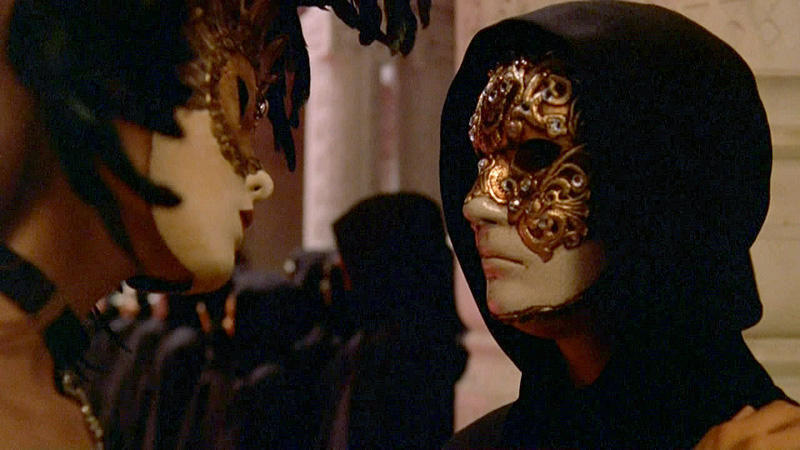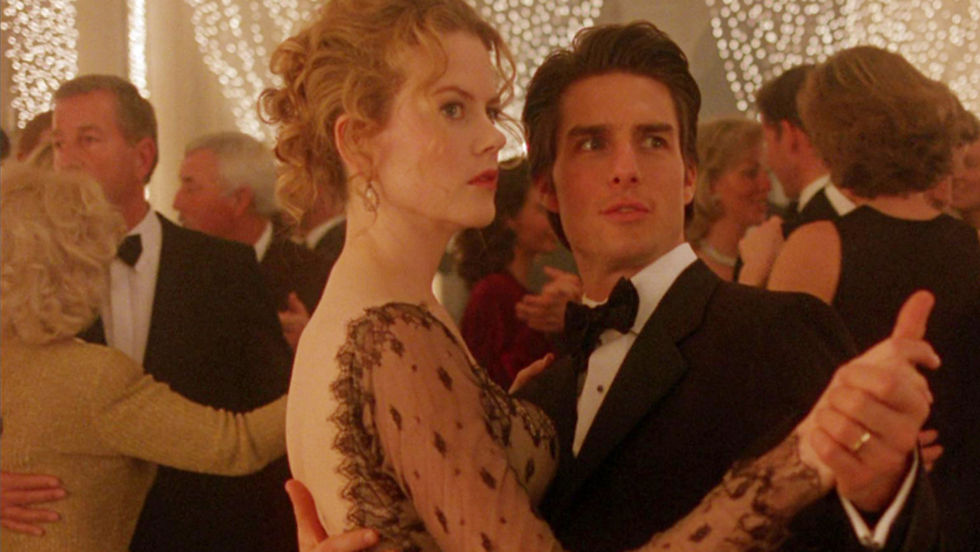"Eyes Wide Shut" -- Kubrick's farewell film
Kubrick was silent for twelve years. Then he worked for four years on the picture, of which one and a half years were spent on filming. All kept a terrible secret. One star acting couple (Harvey Keitel and Jennifer Jason Leigh) was replaced by another (Tom Cruise and Nicole Kidman). They were talking about the scandalous, almost pornographic future of the film, rumors slyly fueled the director himself, promising "erotic thriller. Barely finished the picture, Kubrick died and left many mysteries. An immense field of speculation emerged: every critic, seeing what seems to him to be a flaw, assumes a producer's conspiracy and a secret substitution of an author's solution by an amateur's one. Producers claim that the director had time to complete everything he had planned. That he even agreed to the amendments proposed by the American censors. The orgy scene threatened the film with a NC-17 rating which severely limited its distribution. Then 65 seconds of the film were edited: the figures were digitally imprinted in the frame, overlapping the most explicit details. What happens is clear, but without the naturalism. This is how the film earned the more liberal R rating. Some European countries preferred the author's version.

The reaction of critics to the film is astonishingly varied. A great many people were likened to a horse whose wide-closed eyes were suspended from a flap: look here! We were expecting a new "Lolita" or even "Emmanuelle", or maybe "Caligula" - we got a psychoanalytical odyssey into the darkness of the modern soul. The cry of "Where's the erotica?!!" hung over a disappointed America. Viewers and critics came out not just offended - embittered!

The choice of material was already a mystery. Kubrick took an old (1926) novel by Arthur Schnitzler, an Austrian playwright, doctor, and friend of Freud. Moved the action to modern-day New York City. Tom Cruise plays the status doctor Bill Harford, Nicole Kidman as his wife Alice, an art gallery specialist. At a lavish Christmas ball thrown by their friend billionaire Victor Singler (directed by Sidney Pollack in this role), they both flirt wildly: Alice with a spunky Hungarian, Bill with two models. At home, they act out a jealousy scene. Alice vindictively admits that she, too, is not living up to her husband's boundless trust. This is the setup, after which Bill's strange journey through deserted New York City at night begins, during which he discovers the secret life of human souls and the abysses of his own subconscious lusts. The film culminates with a large, gothically filmed scene of a mysterious orgy in a luxurious country mansion. It resembles both a Venetian carnival and a macabre rite of sacrifice. The demonstrative, slyly naïve kitschiness of the episode gave food for speculation about the senile degeneration of the master, no longer able to show eroticism - erotically.

Meanwhile, if there is, in the opinion of many, something archaic in the film, it is the presence of a direct authorial "message," a moral, frankly read in the final episode. Kubrick did not intend to excite the audience at all. There are a lot of naked female bodies in the film (the critics screamed: where are the male bodies?!), but they are presented contemplatively, like in a museum. The Botticellian images in the film are beautiful, but they are frigid and tinge the inner emptiness and coldness of the characters. It is as if sex is separate from the man-it exists in and of itself as an obligatory and therefore almost obnoxious ritual. Like a compulsive nightmare dream. In the orgy scene, the figures copulate in masks and hooded cloaks - they are faceless, their actions are somnambulistic and devoid of passion. There is only the process of self-satisfaction.

This is Kubrick's recurring theme: the dehumanization of man and society. The same demon - not of sex, but of violence - hovered over the heroes of A Clockwork Orange. And in "Dr. Strangelove" obsession was the utmost distance from the man, turning him into a machine.
Kubrick's widow Christian believes that Eyes Wide Shut is about fear. About the ghosts that possessed the characters. It is no coincidence that many of the scenes resemble The Shining, which the author did not call a horror film, but a "film of terror." Which in English means also horror, but a deeper, heavier, more painful one, not meant to entertain. The theme of sex as an imposing idea in the new picture is connected to the theme of death. This connection is realized literally: at the bedside of her father, who has just died, a woman frantically confesses her love for the distraught Bill. Death is a leitmotif of the film, constantly evoking itself in the TV news, in newspaper hats, even in the whitewashed carnival masks, even in the phosphorescent otherworldliness of the film. New York here is strangely desolate, dark, always raining. The characters' actions are most accurately defined by the word "wandering" - they are aimless, chaotic and illogical, like the actions of a rabbit hypnotized by a boa constrictor. The only one who falls out of the general hypnotic slumber is Zingler. He is businesslike and has sex in between signing papers. The businessman feels comfortable in this world devoid of romance, he belongs here.
The film has a special, un-foreign rhythm. Everything, as in a dream, is lethargic. Phrases in the dialogue are not spoken, but dropped - slowly, word by word. Those who see the picture in the original are lucky: the dubbing will destroy this magic.
Kubrick once again proved that he is more than a filmmaker. He combined cinema with pantomime, even opera, and the vibrating atmosphere of his pictures suggests their musical nature. Hence his constant disregard for the logic of the plot and simple explanations of what is going on - everything lies in the realm of the subconscious and hidden emotions. In "Eyes Wide Shut," the surrealism of the atmosphere from the background became the content, the main element of the cinematic action. To assume salivating pornography is short-sighted and even silly - there is no more sex here than there is violence in the half-ballet A Clockwork Orange.
This is a film about psychological impotence, where love is replaced by habit and resembles an emptied vessel. It is about love, which is "practiced" without experiencing anything substantial. The idea of fidelity declared in the finale is given in a straightforward and disarmingly simple-hearted manner. But the moral is not the point. The film's imagery enters the subcortex and doesn't let go for a very long time. Kubrick's picture is a mourning tape, which the genius of cinema laid on the tomb of an already barren world. His next film should have been about an intelligence that was already completely artificial, covered with synthetic flesh and everything human-like. And that would bring the odyssey to its logical conclusion.
Our sloggers are shot to the screen immediately after their New York premiere. The film everyone is waiting for, has heard so much about, and is so intrigued by, is inexplicably delayed. Cinemas do not know about it. Domestic video companies are in no hurry. It is already obvious that we can't count on the enthusiasm of the distributors. So the appearance of the first DVDs in the "Purple Legion" showroom can be considered the long-awaited Moscow premiere of Stanley Kubrick's last film.
This article was sponsored by Victor Nassar
Comments